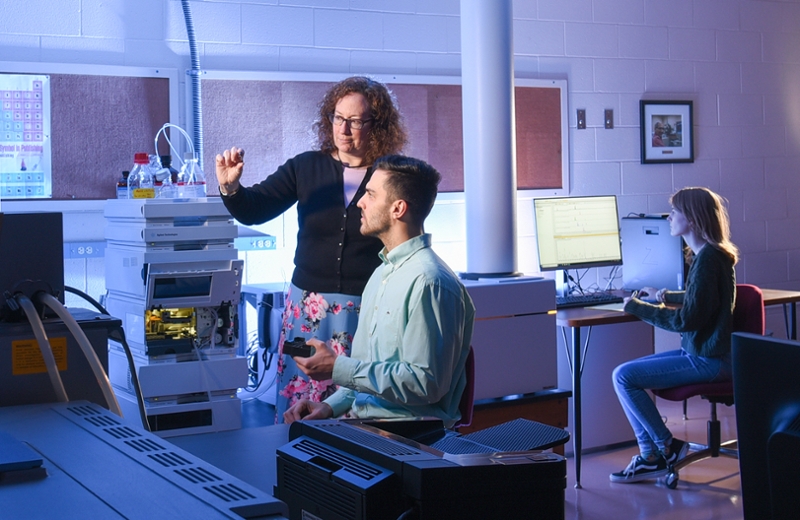
Download Image: Web
Owing to the generosity of loyal alumni and faculty, Lycoming College has purchased an Agilent Liquid Chromatograph/Mass Spectrometer (LC/MS) at a cost of $300,000. The new instrumentation has already been utilized by College faculty and students in the classroom, as well as for research and publication.
LC/MS combines the physical separation capabilities of liquid chromatography with the mass analysis capabilities of mass spectrometry to perform tasks such as determining the molecular weight and molecular formula of known and unknown compounds. Lycoming College’s department of chemistry and biochemistry has been using the LC/MS in organic chemistry courses, and the instrument has quickly become an integral part of their research program.
For example, a project using the new LC/MS involves an improved and safer method for the construction of carbon ring structures via a novel cyclization strategy. This synthetic method is producing, in some instances, previously unknown compounds.
“Such new compounds require, among other things, a high-resolution mass spectrum to allow for publication in the scientific literature,” said Chriss McDonald, Ph.D., Frank and Helen Lowry Professor of chemistry. “Our new instrument is being used to provide the requisite spectra.” Along with Holly Bendorf, associate professor of chemistry, and seven current and past students, the group has a publication presently under review: The Cyclization of Unsaturated Halides by SmI2/TEU-.
The spectrometer’s reach has even extended beyond the chemistry department, allowing for Jeff Newman, Ph.D., professor of biology, to pursue research and subsequent publication.
When Newman’s colleagues at Cornell University discovered a new species of bacterium and wanted to formally describe its characteristics and name it, they reached out to him. “They contacted me because they knew we had the instruments and experience to conduct certain specialized experiments, such as high throughput metabolic tests and analysis of fatty acids and respiratory quinones, the last of which was done with the new LC/MS instrument,” said Newman.
Experiments completed with the LC/MS last semester are included in a manuscript that has been accepted for publication in the March issue of International Journal of Systematic and Evolutionary Microbiology: Manuscript number: IJSEM-D-19-01017; Title: Paraburkholderia madseniana sp. nov., a phenolic acid-degrading bacterium isolated from acidic forest soil (Roland C Wilhelm, Ph.D.; Sean J.L. Murphy, B.Sc; Nicole M. Feriancek; David C. Karasz; Christopher M. DeRito, B.Sc., M.Sc.; Jeffrey D. Newman, Ph.D.; Daniel H. Buckley, Ph.D.)
The purchase of the LC/MS was made possible with a generous donation from a graduate, which the Lycoming College advancement team was able to double through a matching incentive to make the purchase.